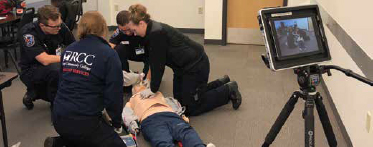
Simulation exercises play a major role in preparing RCC Emergency Services students to become paramedics and emergency medical technicians. An ambulance crew typically consists of one para-medic and an EMT, meaning from day one recent graduates must be fully prepared to handle the range of real-life emergencies they will experience on the job.
“They may be the only para-medic on the scene,” says Gary Heigel, chair of RCC Emergency Medical Services. “They need to be ready.”
To prepare students for success, EMS instructors routinely set up lifelike scenarios that challenge students to practice their emergency response skills and critical thinking within a safe learning environment. New last fall, a techy tool is enhancing lessons by allowing students to review video of their performance in the simulation exercises.
“With any kind of simulation, the key is the debriefing,” says Heigel. “The learning takes place in the discus-sion that comes after you’ve played out the scenario.”
Video feedback allows students to observe and evaluate their own performance. “We’ve been trying to figure out how to include video feedback into our classes for a long time,” Heigel says.
Thanks to smartphones and tablets, video has proliferated in recent years. And though recording video is relatively simple, processing and editing it for instructional use is time-consuming and unmanageable for busy educators who are experts in their fields but not necessarily in video production. And in an educational environment compliant with the federal Family Educational Rights and Privacy Act, recording video raises issues around student privacy.

Heigel is earning accolades for his implementation of a turnkey system by Interact Solutions that offers an app for students and instructors to capture and process video within a secure, web-based portal that can be accessed at any time from any com-puter or mobile device — but it can’t be downloaded or shared on social media.
“It takes less than 60 seconds to upload a 15-minute video” using the Interact Solutions app, says Heigel. “That was the piece that made the video practical.”
For his role in bringing the software to the college, Heigel received RCC’s 2018 Innovation Award, which honors an individual employee who promotes institutional excellence based on the criteria of leadership, out-of-the-box thinking, replicability, affordability and impact. In addition to local recognition, Heigel received a John and Suanne Roueche Excellence Award from the League for Innovation in the Community College.
RCC has an institutional license with Interact Solutions, which means any college program can use the video-capturing portal.
Heigel is an enthusiastic booster: “I’m trying to get as many people as possible to take advantage of this technology. It’s a phenomenal learning tool.”
Already, the video app is being used by the RCC massage therapy program and a fire science class. It also has great potential for public-speaking courses and even faculty training, Heige
l adds. The video project received a $2,096 grant from the RCC Foundation, which enabled its Emergency Medical Services Department to purchase three Padcaster setups that convert an iPad into
a mobile video production studio. For the 2017–18 academic year, the RCC Foundation awarded more than $350,000 in student scholarships, as well as about $17,000 in special project grants that add value to RCC programs and services.
